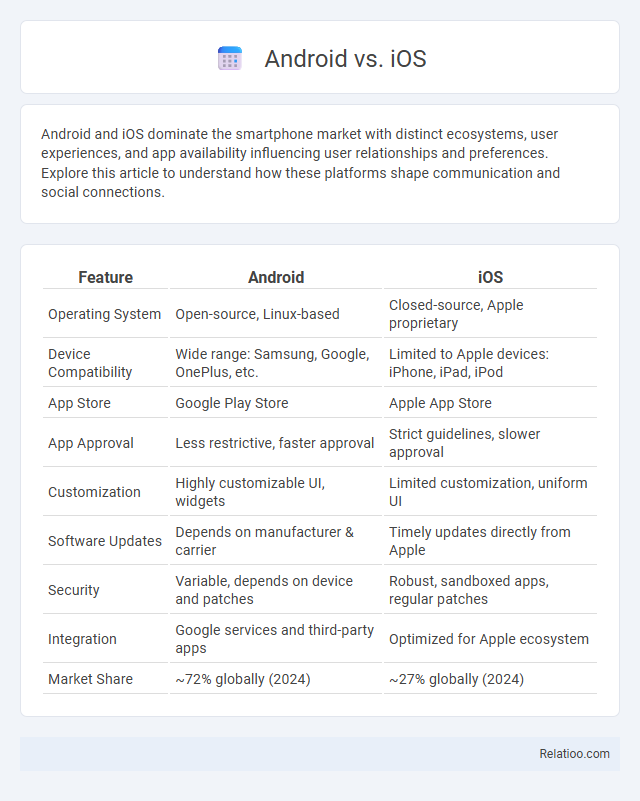Android and iOS dominate the smartphone market with distinct ecosystems, user experiences, and app availability influencing user relationships and preferences. Explore this article to understand how these platforms shape communication and social connections.
Table of Comparison
| Feature | Android | iOS |
|---|---|---|
| Operating System | Open-source, Linux-based | Closed-source, Apple proprietary |
| Device Compatibility | Wide range: Samsung, Google, OnePlus, etc. | Limited to Apple devices: iPhone, iPad, iPod |
| App Store | Google Play Store | Apple App Store |
| App Approval | Less restrictive, faster approval | Strict guidelines, slower approval |
| Customization | Highly customizable UI, widgets | Limited customization, uniform UI |
| Software Updates | Depends on manufacturer & carrier | Timely updates directly from Apple |
| Security | Variable, depends on device and patches | Robust, sandboxed apps, regular patches |
| Integration | Google services and third-party apps | Optimized for Apple ecosystem |
| Market Share | ~72% globally (2024) | ~27% globally (2024) |
Introduction to Android vs iOS
Android and iOS are the two dominant mobile operating systems that power billions of devices worldwide, each offering distinct user experiences and ecosystems. Android, developed by Google, is known for its open-source nature and customization flexibility, making it popular among diverse device manufacturers. iOS, created by Apple, emphasizes seamless integration, security, and a consistent interface across its exclusive lineup of iPhones and iPads.
Market Share and Popularity
Android dominates the global smartphone market with over 70% market share, driven by a broad range of devices and affordability. iOS holds a strong position, particularly in North America and affluent markets, capturing approximately 27% of the global market share with a loyal user base valuing security and ecosystem integration. Market popularity varies by region, with Android favored for its customization and budget options, while iOS is preferred for premium features and seamless user experience.
User Interface and Experience
Android and iOS offer distinct user interface designs, with Android emphasizing customization through widgets and diverse home screen layouts, while iOS focuses on simplicity and uniformity with a consistent grid of icons and smooth animations. Your user experience varies as Android provides broader flexibility for app integration and personalization, whereas iOS ensures seamless performance and intuitive navigation across Apple devices. Evaluating these differences helps you choose the platform that best suits your preferences for visual design and interaction fluidity.
Customization and Personalization
Android offers extensive customization options, allowing you to personalize home screens, widgets, and app behaviors to suit your preferences. iOS provides a more streamlined experience with limited customization but excels in seamless integration and consistent design across devices. From a user perspective, Android is ideal for those who prioritize flexibility, while iOS appeals to users valuing simplicity and uniformity.
App Ecosystem and Availability
Android offers a vast app ecosystem through the Google Play Store, with over 3 million apps available, ensuring extensive availability across diverse device manufacturers and price ranges. iOS maintains a curated, secure app marketplace, the App Store, with around 2 million apps optimized for consistent performance on Apple devices. Developers favor iOS for higher revenue potential, while Android's broader global reach provides unparalleled market penetration and app accessibility.
Security and Privacy Features
Android and iOS offer robust security and privacy features, with iOS emphasizing strict app sandboxing, regular updates, and hardware-based encryption, while Android provides extensive customization, Google Play Protect, and enhanced permission controls. iOS's closed ecosystem reduces malware risks, whereas Android's open-source nature demands vigilant user management to prevent vulnerabilities. Both platforms implement biometric authentication and secure data storage, but iOS typically leads in privacy transparency through features like App Tracking Transparency and Privacy Nutrition Labels.
Device Compatibility and Hardware Choices
Android offers extensive device compatibility with a wide range of hardware options from various manufacturers, providing you with diverse price points and features. iOS is limited to Apple devices, ensuring tighter integration and optimized performance but fewer hardware choices. Choosing between Android and iOS depends on whether you value variety and customization or seamless compatibility and premium hardware.
Performance and System Updates
Android and iOS differ significantly in performance optimization and system update processes, with iOS generally providing faster, more consistent updates due to Apple's control over both hardware and software. Android offers greater device variety but can experience uneven performance and delayed updates because manufacturers and carriers manage the rollout. Your choice should consider whether you prioritize timely system enhancements and seamless performance (iOS) or device diversity and customization options (Android).
Price Range and Affordability
Android devices cover a broad price range from budget models under $150 to premium smartphones exceeding $1,000, offering affordable options for various budgets. iOS devices tend to have a higher starting price, with iPhones typically beginning around $700 and extending beyond $1,500, reflecting a premium cost for Apple's ecosystem. Your choice depends on affordability preferences, with Android providing more economical options and iOS focusing on higher-end market segments.
Which Platform is Right for You?
Choosing between Android and iOS depends on factors like device variety, customization, app ecosystem, and security preferences. Android offers extensive device options, flexibility in user interface, and a more open app store, making it ideal for tech-savvy users who value personalization. iOS stands out with seamless integration across Apple devices, stronger privacy measures, and consistent app quality, catering to users prioritizing reliability and a polished user experience.

Infographic: Android vs iOS
 relatioo.com
relatioo.com